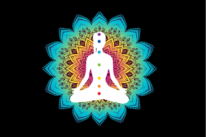
“When we…go back into the past and rake up all the troubles we’ve had, we end up reeling and staggering through life. Stability and peace of mind come by living in the moment.” ~Pam Vredevelt
There is a way in which we tend to view issues in our lives that makes it seem like the issue is a big, scary monster that chases us around everywhere we go.
We have commitment issues. Or we are bad with money. Or we have an eating disorder, we drink too much, or we follow-through too seldom.
We view ourselves and our lives as if they are stable, consistent entities that probably can change, but rarely do. We surely never change without considerable time, money, or effort.
At one point in my own life, I definitely felt like I had weaknesses and issues, particularly around food. It felt as if they were mine, like I had ownership of them. They were part of who I was.
It felt as if my “disorder” was a living, breathing monster that I would never fully shake.
And that’s the way it goes. It begins to feel like the issue is always there, following you around.
The monster might be right on your heels some days and further away other days, but it’s always there in some capacity. The monster might take naps or even hibernate, but there is the sense that it could wake up at any moment.
If you’re too loud or not careful enough, the monster will wake up and be right at your back again. So there’s no resting, really. You never get too comfortable. I know I certainly never got too comfortable; always looking over my shoulder for the next time the monster would catch up with me.
(It’s easy to see how we came to view it this way, between traditional, past-focused psychotherapy and popular addiction recovery movements that say things like “You’re an addict for life” and “One more drink and you’ll be exactly where you left off.”)
So, guess what happens when it feels like fully resting is out of the question?
You guessed it—you don’t rest. You’re on guard.
You hold in the back of your mind the image of that monster waking up and beginning to run after you again.
You never quite manage to let that thought go because you believe—you’ve been led to believe by well-meaning but misinformed professionals—that the issue is a part of you. Of course it would never occur to you to let go of something you believe you can never let go of.
Each time the thought of your monster passes through your head, it feels ominous and meaningful. When something feels ominous and meaningful, you naturally pay it some attention.
If you believe you are bad with money and you go a little overboard at Nordstrom one day, it’s very serious.
If you believe you have commitment issues and the thought occurs to you to run from your relationship, you might actually act on that thought because it seems real. That thought appears as your reality, not as the fleeting, habitual but arbitrary thought it truly is.
For me, because I was told I “had” a diagnosis and that diagnosis signified a real and stable thing, anything I ate became a very big deal in my mind. The very common and meaningless act of eating a meal began to mean a whole lot about who I was as a person and it said something—in my biased thinking—about my future.
You Can Only Feel What You Think
Aside from the fact that monsters are scary, the other problem with the monster-chasing-you metaphor is that it is completely, factually inaccurate. It is quite far from the truth of how your “issues” and experiences of life work.
Your actual issues are nothing like a monster chasing you.
A closer approximation of how it works is something like this:
Your moment-to-moment experience is a reflection of your moment-to-moment thinking. Said another way, what you feel is only and always what you happen to be (consciously and unconsciously) thinking.
Sometimes you think a lot about your issue. When you’re thinking about it— especially to the extent that your thinking seems real and true, as if it directly reflects reality—it appears as if you have the problem you are holding in your mind.
When the thoughts you are experiencing seem like stable truth, you’re naturally locked into them. You elaborate on them, take them seriously, and inevitably act on them.
But here’s the cool part: Your thinking changes. Often. It’s always changing in obvious and subtle ways. When your thinking changes, your experience changes.
And, the thoughts in your head are not an accurate snapshot of outside reality. They are quite subjective and personal, actually. No two people see the same thing in the same way, so what you think is only what you think, much more than the way it is.
The points above work together because the more you see that your thinking is very subjective and personally biased, the less you rely on and respect it as truth. The less you rely on and respect it as truth, the more frequently and naturally your thoughts change because you’re not holding them in place, identifying with them, and owning them as “yours.”
There Is No Monster
Since your experience in any given moment is exactly equal to what you are thinking in that very moment, that means that when you’re thinking about your monster, you feel your monster.
And when you’re not thinking about your monster, your monster does not exist.
When you’re thinking about your commitment phobia, how your parents damaged you for life, how you’re an incurable alcoholic, or how horrible you’ve always been with money, those issues (monsters) are alive for you in that moment.
My eating issues were alive for me most of the time in those years solely because I was always thinking about them.
But when you’re thinking about your cat, or pondering hard wood versus tile in your kitchen, those issues are not alive for you.
It’s not that the monster is asleep, waiting to strike. It’s that the monster literally does not exist.
You see, each moment of your life, you start anew. The inner slate of your mind is wiped clear.
Because we tend to give some thoughts a lot of respect, and because we believe they reflect outside truth, those thoughts tend to come back often.
In that way, it doesn’t always feel like the slate wipes clear. It feels like the monster is right on your heels.
But actually, we have infinite potential for brand new thought, which equals infinite potential for brand new experience. We tend to get more new thought when we know that.
In other words, when you think of your issue as the monster on your heels, that’s what you get. But only because that’s the way you’re thinking about it.
When you see it more accurately, understanding that you’re only feeling what you’re thinking in any moment and that when your thoughts shift—as they inevitably will—you get limitless new thought which brings limitless new experience, it all changes.
You see that you’re creating your life anew in each moment. There is no monster, unless you create him right now by thinking about him right now.
Nothing is actually carried over from the past. Rather you might think right now about the past, but that’s just where your thoughts wandered.
I’m happy to report that I have had no issues with food for many years. Eating when I’m hungry is a complete non-issue. This is not what my therapists told me would be the case. I was told that because I “had” the issue at one time, I would most likely always have it in varying degrees.
I was told that I could learn to manage it, and that it may lie dormant if I was lucky, but that in times of stress it would most likely flare up again.
Nothing could be further from the truth today.
There is no monster. There never was. There’s only what we think, now. And then now. And then now.
Of course, thoughts of our “problems” will drift into our mind. We’re only human.
But because we see that they will also drift right out, there’s no reason to keep constantly looking over our shoulder.
Photo by Jesus Solana
About Amy Johnson
Dr. Amy Johnson is the author of several books, including The Little Book of Big Change: The No-Willpower Approach to Breaking Any Habit. She is also the creator of The Little School of Big Change, an online school that helps people find lasting freedom from habits and anxiety. Please go here to get a free sneak preview of the school.













 Though I run this site, it is not mine. It's ours. It's not about me. It's about us. Your stories and your wisdom are just as meaningful as mine.
Though I run this site, it is not mine. It's ours. It's not about me. It's about us. Your stories and your wisdom are just as meaningful as mine. 